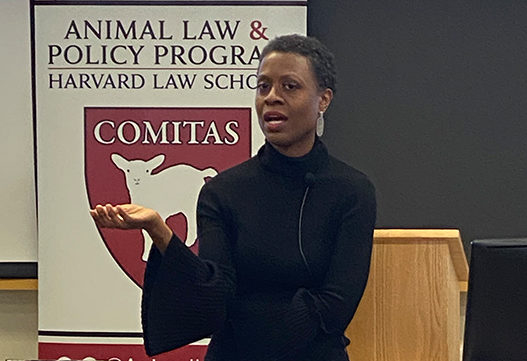
June 18, 2020Animal Law & Policy Program, Animal Law & Policy ClinicAnimal Law & Policy Program Summer 2020 Newsletter
The past few months, weeks, and days have vividly and tragically highlighted the interlocking injustices and oppressions that characterize our world.
The past few months, weeks, and days have vividly and tragically highlighted the interlocking injustices and oppressions that characterize our world. A virus now known as COVID-19 rapidly spread through a live animal market in Wuhan, China, sparking a global pandemic. The rush to condemn China’s animal markets for their cruelty and dangerousness often played upon xenophobic sentiments and neglected to note that the very same conditions exist in animal markets around the world, including in the United States.
Powerful reporting also has called attention to slaughterhouses as equally deserving of scrutiny for facilitating disease transmission. At the same time, the meat supply chain was designated “essential” to the nation and workers in these slaughterhouses—some of the most vulnerable members of society—were forced to work in conditions even more dangerous than usual and accordingly contracted COVID-19 in disproportionately high numbers. When slaughterhouses no longer could operate at full speed, animals raised for food were killed as “surplus waste” in horrific ways even crueler than industrial slaughter itself.
African-Americans have contracted COVID-19 in disproportionately higher numbers than others in the U.S., exposing the inequities of living with systemic racism in health care and in society in general. The murder of George Floyd was an act of racist violence, reminding us once again that oppression is all around us, a chain that seems to grow longer and tighter.
The Harvard Animal Law & Policy Program recognizes the interconnected dimensions of injustice and believes that we cannot simply pull out one strand and work on it in isolation without an awareness of how others might be impacted. This spring, the work of the Program, the Clinic, and our Faculty, Staff, and Visiting Fellows reflects our commitment to these principles. This newsletter captures some of that work, including Visiting Fellow Amy Fitzgerald’s work on animals in Intimate Partner Violence, Executive Director Chris Green’s efforts to reduce the number of animals killed by police, and Clinical Instructor Nicole Negowetti’s advocacy for just food systems.
Other contributions include Visiting Professor Justin Marceau’s research rethinking criminal punishment in animal law, Clinic Director Katherine Meyer’s supervision of the Clinic’s challenging the environmental impacts of the proposed Border Wall, and Faculty Director Kristen Stilt’s work at the intersection of animal protection and religion. The Program itself also just launched a major research project on the global regulation of live animal markets.
In these times, such work is more important than ever. While rapidly adapting to our new remote realities, we have been fortunate also to expand our efforts to address new and pressing problems and challenges.
Against that backdrop, we are sending news and updates from this past Spring semester at Harvard Law School. We have much to be grateful for and share. Thank you for your continued interest in our mission, and may you and your families be well.
